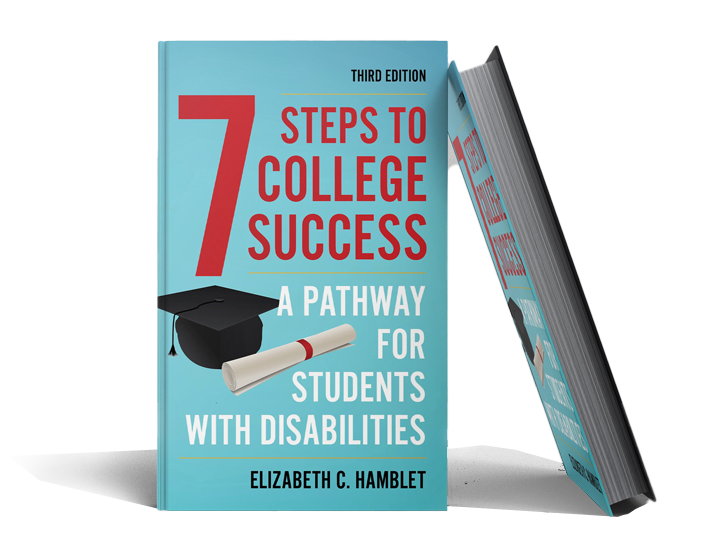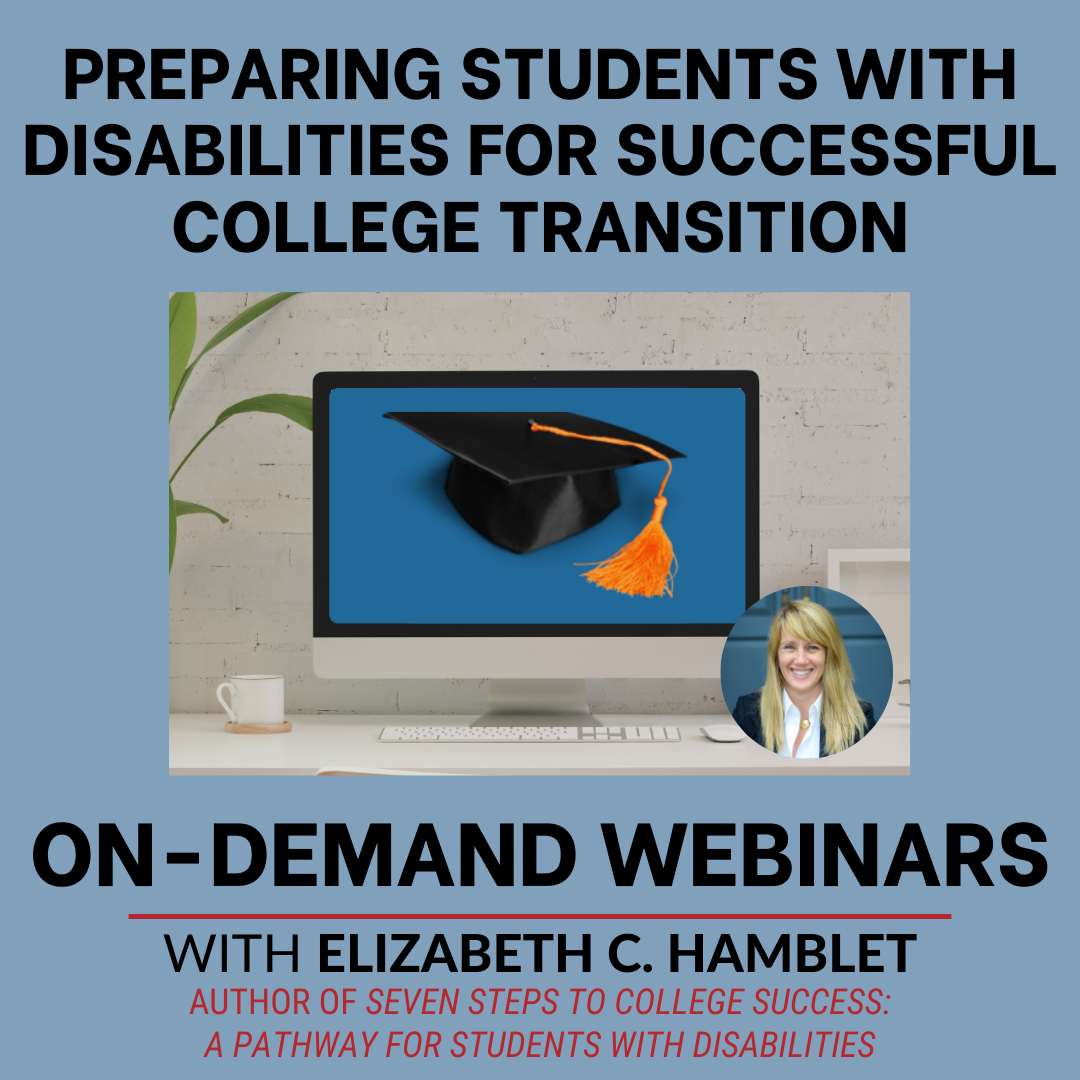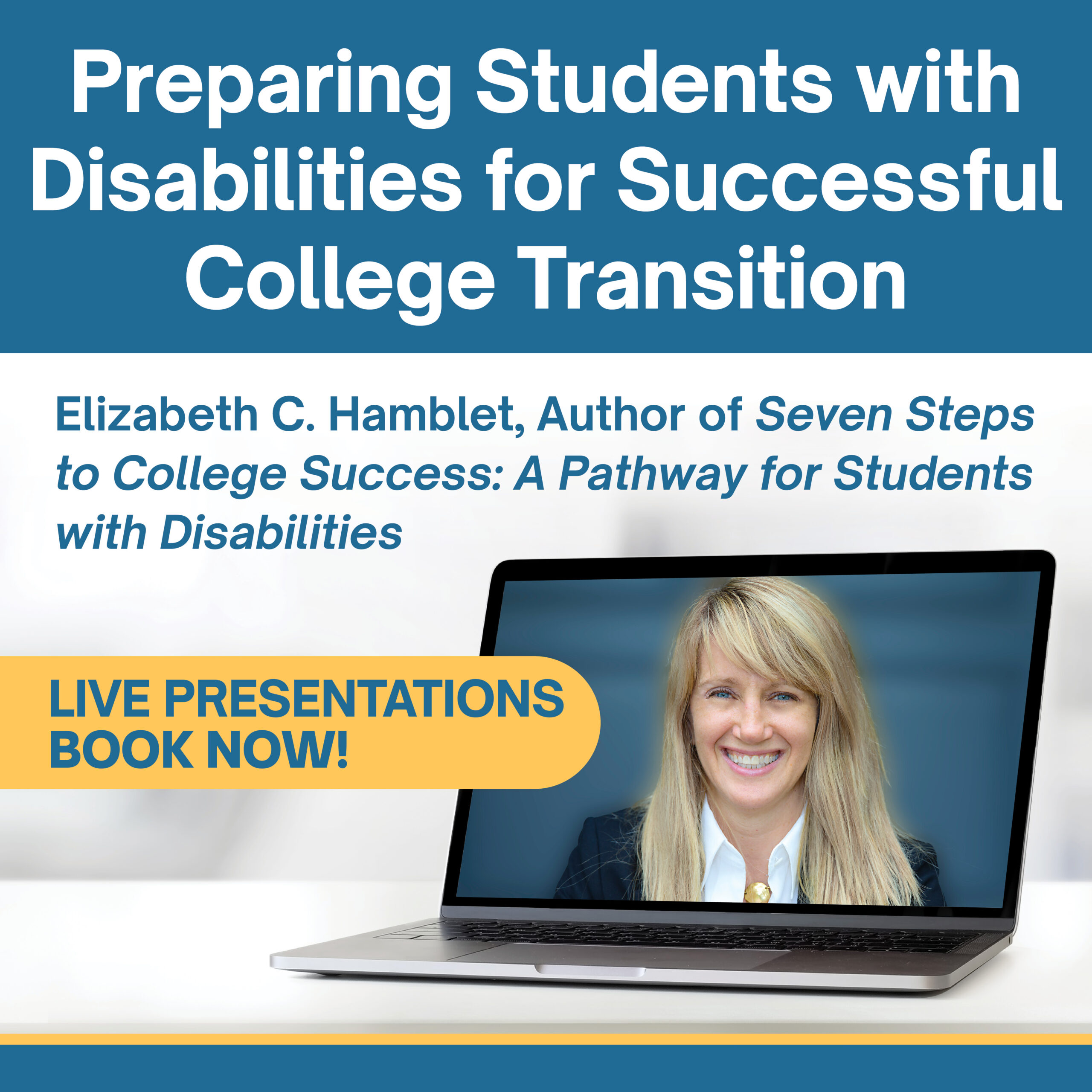Introduction
When students with disabilities transition to college, they will have to adjust to the new environment. Like their typical peers, they will likely have to find new ways to study and learn. And if they want to receive accommodations, they will also have to register with the disability services office and be involved in the accommodation process.
In the development of my book on preparing students with disabilities for successful college transition I asked disability services directors at a variety of schools to share their advice for students.
Marvin Williams is Director of Disability Resource Services at CSU Stanislaus
You can do it! Don’t give up.
There are a lot of people who will tell you not to consider college because you have a disability.
Try your best, work hard, and go out there and realize there people who are willing to help you. Pay more attention to the people who want to help than those who don’t. They’ll be cheering you on when graduation day comes. Stay with it.
Catherine Getchell is Director of Disability Resources at Carnegie Mellon University
Advocate, communicate, and take responsibility. It’s your college career, your disability, your accommodations, and your future. Own it.
Margaret Camp is Director of Student Accessibility Services at Clemson University
Connect early with our office if -at some point – you might want accommodations at college. It’s okay to say, “I’d like to try going without my accommodations but it’s good to put everything in place in case I need them.” Too often, we see them the week before final exams. They say, “I thought I was doing fine but I’m failing my courses. How can you help me?” If they come to us then, it’s too late to salvage the semester. (Accommodations are not retroactive.)
If you put things in place with us early, there’s a much better chance we can help you if they show up shortly before an exam. You can even see us halfway through the semester and have things in place for finals.
The only exception where we need to set things up in the beginning of the semester is the medical absences agreement. In that situation, you can’t show up at the end of the term and say, “I need my 9 absences excused.” That has to be agreed upon from the beginning. It can’t be retroactive, either.
Eric Trekell was Director of the Center for Disability Services at Everett Community College at the time of his interview
Being independent is important. But it doesn’t mean you shouldn’t take advantage of the resources. You should learn how to manage their affairs, including school.
Shop around – maybe the local school isn’t the best match for you. Don’t choose a school just based on their reputation for different types of disabilities. Go to the school that is best for you and what you want to do in their career – find a school that balances your needs and wants. And don’t just go somewhere because that’s where your parent went.
I used to teach a success course, and I want you to know – straight A students go see tutors. Just because you feel like you’re passing a class doesn’t mean you can’t see one. Take advantage of every service on a campus – tutoring, academic success programs, counseling, career counseling – explore!
Stacey Reycraft is Director of Student Disability Services at the University of Mississippi
I know this is easy for adults to say, but you should start to take control of their educational experiences while you’re still in high school. Know how to talk about your disability – go to your IEP meeting, talk with your parents before you come to college. Once you get here, it’s hard to learn that when you’re in the middle of it than when you’re in things.
Once you get to college, seek out assistance. Don’t be afraid to go to the disability services Talk to your instructors – they’re the experts who can tell you what you need to be studying. Reach out to the tutoring center or writing center or any other kind of support.
Be comfortable and confident enough with yourself to seek out help. Because everybody needs help. You just have to ask for it.
Deborah Braswell was Director of Disability Support Services at University of Montevallo at the time of her interview
We want to hear from you when you have your intake meeting – it’s not Mom’s meeting or Dad’s meeting. [Braswell is referring to the meeting many college disability services offices include as part of the process when students register for accommodations after they’ve enrolled.]
Some colleges will invite parents/guardians to participate in that meeting but others won’t because they want to hear from the student.
The earlier you can learn to articulate why you need the accommodations you need, the better. It’s helpful if you can say, “Here are the accommodations that have been helpful to me, and here are the ones my high school offered me that were never helpful.” Or maybe even be able to say why it wasn’t helpful- as the college may offer something similar that might actually work better.
It’s important to develop habits like checking your email every day.
And you need to set aside time to study. Sometimes, students will say to me that they studied for two straight hours before the test and they are surprised that they didn’t do well. Its better to study some every 3 or 4 times a week for each of the three weeks leading up to the test – not just two, or even six hours the night before the exam.
I understand a lot of students did not need these kinds of strategies in high school, but the way you study in college is very different.
Jamie Axelrod is the Director of Disability Resources at Northern Arizona University
Find a place that has a program that is a good fit for you, that’s an environment for you that feels welcoming to you and to students with disabilities. Investigate the office. Don’t just assume that every place is going to run the same or people are every place is going to provide the same level of service or access.
Jorja Waybrandt was Coordinator of Accessibility Services at the University of North Carolina School of the Arts at the time of her interview
As soon as you make a decision to enroll in a college or university, go to their website and type “disability” into the search bar for the school. You should be directed to the web page for the Office that provides disability-related services on campus. Check out their webpages for the selection of what they offer and then follow the steps noted for submitting documentation of your disability. If you have questions, please take the time to reach out by phone or email to learn more.
Also, take time to explore other campus resources for students so you are aware of what is offered and how you can connect. Generally, this information is discussed during Orientation for new students; however, there will be so much material covered during that time that you will be on information overload.
Ann Knettler was Director of the Center for Disability Services at Delaware State University at the time of her interview
When you’re picking a college, don’t pick one just because of the disability service office. The school needs to be a fit. Meet with the professors. What do you think of the dorms? What do you think about the tutoring?
I want you to be comfortable with our office. You’re whole person, and your whole person needs to be cared for and satisfied.
Also – use your resources. Don’t wait until you’re really lost to go to tutoring or office hours.
Don’t’ be intimidated by professors. They want you to go to office hours. You’re not bothering them. The earlier you do this, the sooner you can establish a relationship. Then if you have a question later, you’ve broken the ice, and you may be more comfortable.
Also – you deserve to be here as much as everyone else.
Paul Harwell is Director of the Department for Disability Support Services at East Carolina University
Be accountable. Take ownership of the process
Also – data shows that students do better when they “find their person” on campus. It could be your academic advisor, your coordinator at the disability services office – it doesn’t matter. Get connected to someone.
Doris Pierce is Director for the Office of Accessibility Resources and Services at the University of Central Arkansas
Connect with our office first, if you have questions about accommodations. Do the video tour, understand the landscape of the college you’ll be enrolling in. Get as much knowledge as you can.
Also – start initiating making your own appointments, order takeout. Find opportunities to be responsible on your own before you transition to college.
Attend transition fairs for things you want to do. The more knowledge you have, the better-informed decisions you can make.
Register with us as soon as you can. Once you get on campus. everything else will attract your attention – organizations, parties, etc.
Lean how to manage your time now. Time management can be a friend or foe. You won’t be successful if you don’t learn how to do that. Practice it while you’re in high school.




